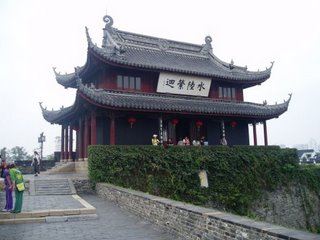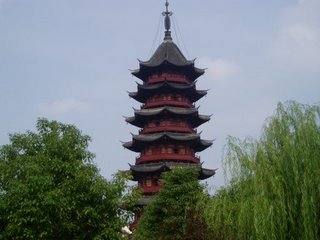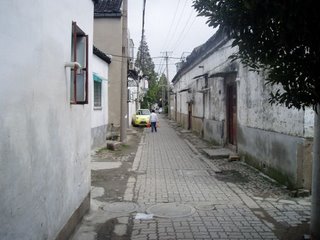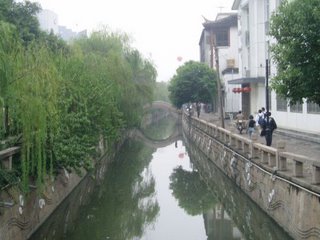3/10
I had planned to visit Zhouzhuang today but instead I have chosen to do nothing much. I woke up far too early and I feel tired. Why early? It turns out I am sharing with a couple of young Germans, who had a long, loud conversation at sixish. I don’t do sixish.
I had a boring evening. My previous night’s drinking partner, a Pole called Slavko, had been stricken all day with a hangover. Well, with brandy at 15 kuai a bottle, there’s a real temptation to overindulge. Also, his friends, who had been friendly the night before, had obviously tired of my company, because they spent the evening speaking Polish. On TV was pingpong, which is not and never will be a spectator sport.
I am trying to get a coffee. I am in a pizza shop that promises espresso and other delights. But I am learning that what is promised and what is delivered are not always the same thing. I ask for a coffee with milk. The waitress asks the cook do they have it (I’m guessing that’s what she asked — she might have been saying “Let’s fuck with the foreign devil”). The cook says no, it seems. But I can have cappuccino. I wait for 15 minutes. The waitress comes back. There is no cappuccino. But I can have coffee with milk.
*
At Pan Men, the last remaining city gate, there are performances of pingtian — Suzhou-style ballad singing. A man and a woman play traditional instruments that in effect, if not in looks, are like banjos — deeper, hers higher and more intricate. They duet in the local Wu dialect, incomprehensible to me and, I think, most of the Chinese tourists. It’s oddly affecting, the singers’ voices ache with yearning and sighing longing. Pan Men is superbly packaged — a tourist precinct that encloses several sights in the southwestern corner of town. For those who like a taste of history, it is perfect. In a pavilion in a small garden in the precinct, an old man — perhaps 60 — is talking to two young girls, who are listening attentively. I can’t help wondering what he is telling them.
*
I am sorry to be leaving Suzhou. If I had more time, I would spend longer here. I am not tired of it. I cannot say it is particularly friendly because I am isolated and insulated by language and wealth. This latter idea started me thinking about the people who live down the muddy back alleys of the old town. Because I thought about the man who had the Couple’s Garden built so that he could live in seclusion in his island right in the middle of old Suzhou. Life looks hard there because, I suppose, I associate dirt and brokenness with hard living. In the West, if a place is falling apart, that is a sure sign that it is rough. What can their lives be like though, these people who live and die in Suzhou? Do they spend all their days playing mah jong or cards in their front rooms or out in the street? They seem happy: I see lots of people laughing. And of course they are in their element. They know how things work, who is who.
What kind of people are they? It’s impossible to penetrate the barrier of language and culture to get any idea. I simply cannot imagine. It’s easy enough to resist the temptation to think them lacking in compassion because they have no manners (and there are so many people in the West that have neither). Harder to imagine how they can construct complex thought in their spare, unnuanced language. I was never quite convinced by the Sapir–Whorf hypothesis, yet it is hard to imagine what thought even is without words to think it is. Even feelings are strongly mediated by language, in that we must think about them if we are to know what they are.
You wonder what they make of their world. Does it frustrate them that crossing a road requires weaving and bobbing to avoid cars, scooters and bikes, which come from all directions regardless what the signals show? Do they crave peace in their noisy cities? Does the rapid change, which must be ripping, apart their world, making it almost each day harder to interpret, scare them or enliven them? (We have all heard that it is a Chinese curse that one should live in interesting times.) The change seems wild and unevenly applied — some have become rich, others have remained dirt poor. The countryside has moved to fill massive cities (even Suzhou — “the Venice of the East” — has large industrial districts that must have attracted many from the land), but with wages so low, the rural poor have simply become the urban poor.
Tonight in the vegetarian restaurant, I see an old lady — at least in her 80s — out with a crowd of family members. She is having the time of her life and they are loving it along with her. This time of year is big for families, already central in Chinese people’s life, and on the day of the Moon Festival — a couple of days from now — those who are away from their home feel a deep yearning for it. Today I spoke to my children on the phone. I understand yearning. Whatever I do or don’t know about people, I know what it is to yearn. I am like China, restless and difficult. But I am finding that whenever China seems hard, I turn a corner and it becomes easier.
I do not pretend to understand the people who live in Suzhou. I will not think when I have finished my trip that I know “the Chinese”. I am only seeing the tourist towns, a glimpse of a particular face of China. And after all, I have known Englishpeople all my life and I do not pretend to understand them either. But I see the mother wiping her child’s nose in the street, the father on the bus carefully keeping his daughter from catching herself on the straps of my pack, and I renew my faith that whatever else we are, at base we are human beings, the same mass of fear, confusion and deep reserves of love under the layering of language, colour and way of life that makes us seem different.







<< Home